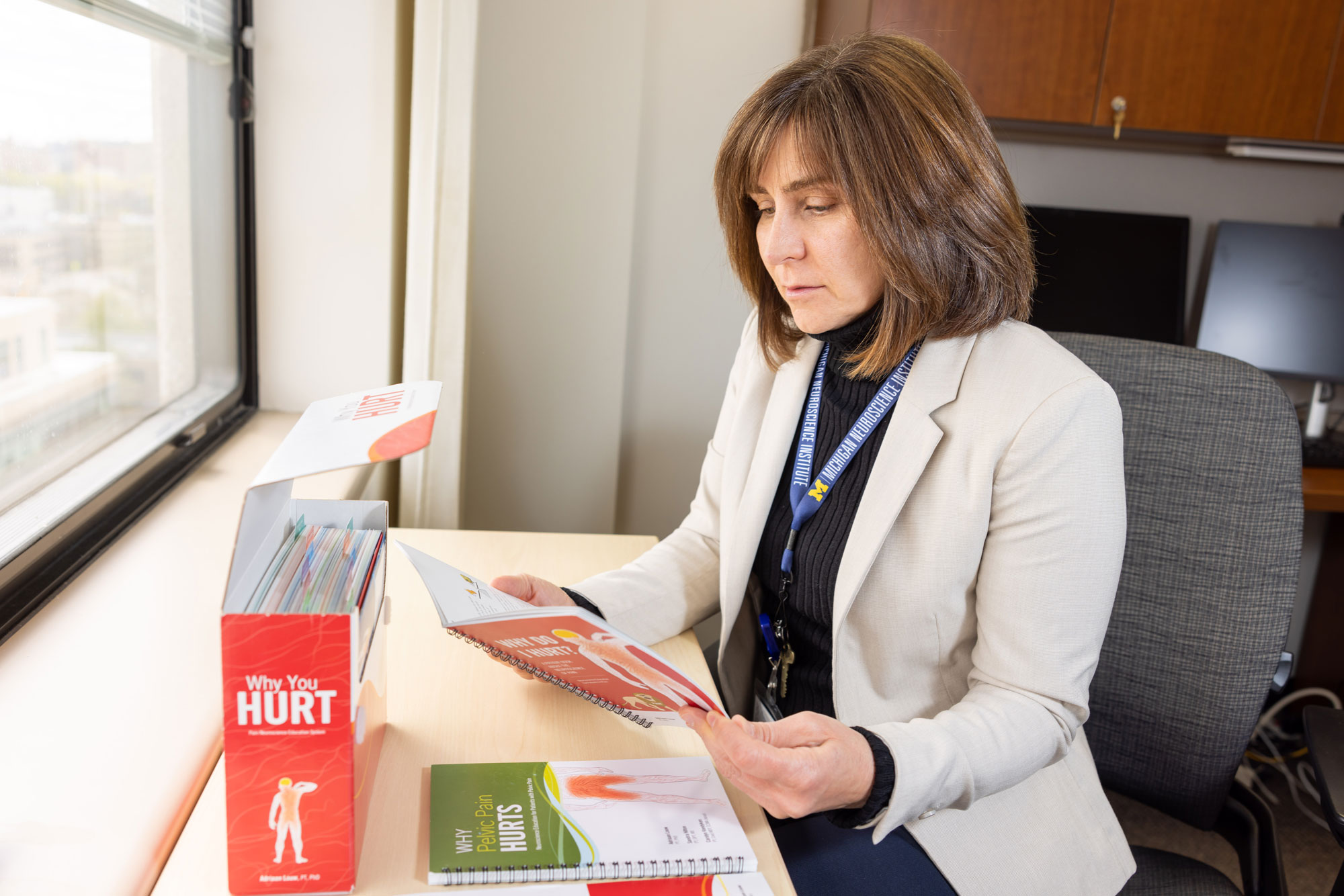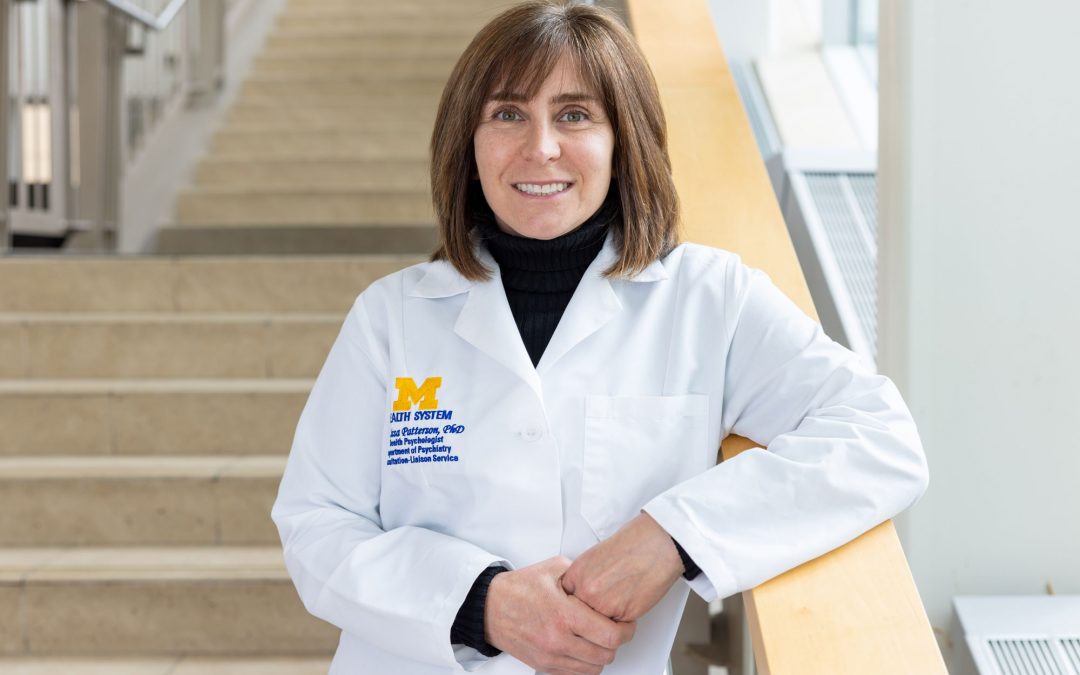Cohort 3 RISE Innovator Elissa Patterson is looking to develop new pain management course materials for learners that teaches core competencies in pain management
Elissa Patterson, Ph.D., clinical assistant professor of psychiatry and neurology, is a health psychologist who treats hospitalized medical and surgical patients. Her role is to optimize the behavioral factors that help patients heal as swiftly as possible. She is particularly passionate about holistic pain management methods that can aid in the battle against the opioid crisis that continues to affect hundreds of thousands of people.
Patterson recounted an experience she had as an intern in psychology, working with a young man who was recovering from an opioid addiction that started with a prescription given for pain.
“When I met him for our intake visit, I was afraid I did not have the expertise to help him, and I told him. He told me that he knew enough about what he needed to do and that if I were willing to be compassionate and open, he wanted us to work together. From that somewhat shaky beginning, I got to know him deeply as a person, not just the part of him that was an ‘opioid addict,” she shared. “He taught me about the internal demons that he struggled with and the external forces that sometimes made life harder for him, such as when medical professionals had given him opioids when he did not need them. He was smart, strong, creative, funny, caring, enterprising and determined, and he did well.”
Without the opioid addiction ruling him, the man recovered and began living his life, which included a new job, living independently and dating. Tragically, Patterson later discovered that despite these successes, he died a few years later under circumstances that suggested he had overdosed. His story in particular along with many others continue to motivate Patterson in her work.
Working with RISE
Patterson is currently participating in the RISE Innovation Development Program to create novel course materials that educate medical students on treating pain in a collaborative and multidisciplinary way.
“As a psychologist in a medical environment, I am attuned to the ways that behavior and the mind can impact the physical body, and vice versa. This is an active area of growth for health care systems,” Patterson stated. “I’m hoping that this new pain education will empower clinicians, patients, and family members with a broad range of tools and skills that harness the interactions of the mind and body.”
By starting with medical students, Patterson hopes these new materials will boost future physician skills and confidence so that they can have a tangible impact in this clinical area that has been problematic due to the opioid epidemic and the worldwide problem of chronic pain.
“I see this as an opportunity to help the medical students learn about pain perception and management and how to collaborate effectively with other health care professionals, and even people outside of the health care field who take care of patients who suffer from pain.”

Elissa Patterson reads over educational materials on pain management while sitting in her office.
RISE is supporting Patterson as she develops and implements this idea. Participants in the Innovation Development Program, known as Innovators, receive support to develop their ideas in a variety of ways, including monthly workshops, individual meetings and leadership coaching over the course of 12 months. RISE focuses on supporting innovators with new ideas that have the potential to change existing approaches in teaching and learning, scale to different areas and learners, and improve practice and health.
“The RISE mentors and other innovators create an exhilarating comradery and shared sense of purpose. The RISE mentors have introduced me to members of the education community and given me a vehicle in which to move this project forward. I am grateful to have a whole team helping me think about concrete steps and the elements that I need to consider in order for this to be successful.”
Having the opportunity to work with RISE leaders and fellow Innovators has also contributed to how Patterson is approaching this work.
“They’re very methodical in their approach. Having space to talk about these ideas with others lifts the spirit. It’s inspiring every time we have the monthly Deeper Dives and even the one-on-one meetings. It’s such a great group of people who are dedicated to helping our learners, and helping our communities. It goes beyond the content of what we’re teaching.”
For those within Michigan Medicine who are considering engaging with RISE, Patterson had this to share. “I would say that it’s a top-notch transformational program that supports innovators with dual purposes. One is to support the leadership and growth of the innovator, and the other is to create innovation that is going to help the overall community.”
The path ahead
By the end of her fellowship, Patterson intends to have course materials that will be implemented in the medical school curriculum. While she is piloting this idea with medical students, her goal is to expand this content to other learner populations over time by working with the Center for Interprofessional Education. “My short-term vision is to start with medical students and include a component that allows them to interact with professionals from other disciplines, and then the long range goal is to create a product that could be implemented in other schools as well,” she shared. “That’s part of what the RISE team is helping me figure out, what are the steps to get something off the ground right now and then plan for greater impact and scalability.”
“By creating a curriculum based on best practice core competencies that include multiple domains of care, we expand the variety of resources that we and our patients can use to get control over pain. Knowing what others can contribute distributes the weight of this heavy burden and will hopefully support the well-being of our future physicians,” said Patterson.
“There are people doing phenomenal work to combat the opioid epidemic and treat pain effectively throughout Michigan Medicine. I hope that this project will be a platform to continue to weave that widening net for patients and clinicians who struggle to find effective solutions for pain management.”
To stay informed about RISE opportunities and education innovation happening at Michigan Medicine, join our community.
Photo credits: Camren Clouthier
